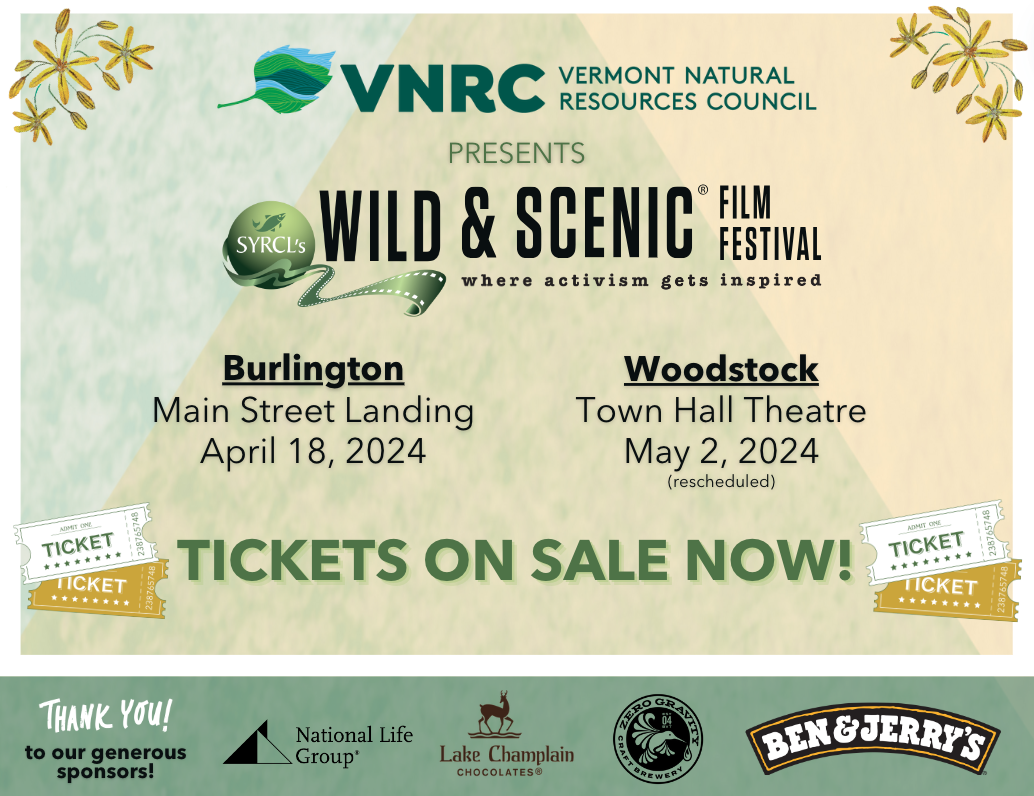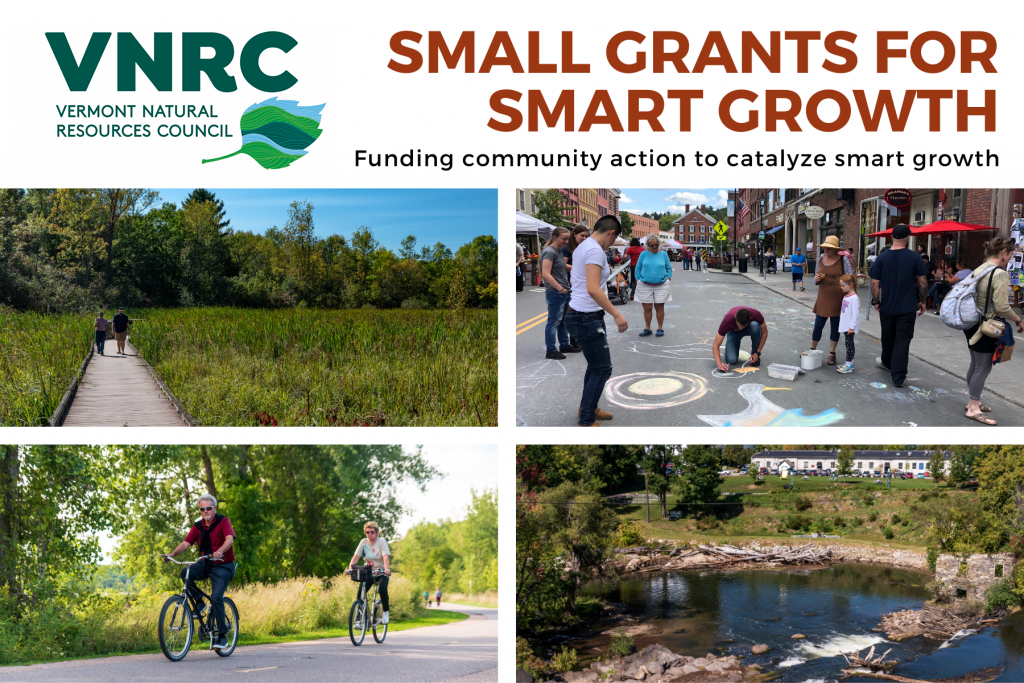
Do you want to survey your community about future development in town? Do you want to engage your neighbors on improving local housing options? Do you need to run an ad to demonstrate community support for a project?
Small Grants for Smart Growth, launched in 2018, provides seed money for catalyzing community-based initiatives related to smart growth.
VNRC’s Small Grants for Smart Growth program, in collaboration with Preservation Trust of Vermont, is seeking competitive applications for a special grant round of up to $5,000 for communities seeking to build momentum toward flood-resilient community development. Find out more and apply here.
What is smart growth?
Where and how we develop affects our quality of life, how we get around, our natural resources, and how inclusive and affordable our communities are. Smart growth is an approach to land development that can make our communities more livable in all of these areas, by investing in our unique villages and downtowns and fighting sprawl, which makes Vermont feel less like Vermont.
Smart growth allows for a variety of housing for people of all ages, transportation choices, unique places for everybody to enjoy, and healthy farms, forests, and natural areas. It prioritizes public participation in making decisions about what the future looks like, so that our land use decisions are inclusive, not exclusive.
What kinds of projects do Small Grants for Smart Growth support?
Projects might involve advocacy for better land use, by getting involved in the “nuts and bolts” work of municipal planning, regulations, or a permitting process. A project could also be a town or local group effort to promote downtown or village center revitalization and historic preservation; to develop a plan for better sidewalks or paths; to identify ways to support housing choice and affordability; or to plan on conserving land for agriculture or forestry. See below for a list of past awardees.
These grants acknowledge that community leadership and small steps are essential for catalyzing change. Think creatively about how you can advance smart growth in your town! Consult the dropdown menus below for further guidance.
How big are the grants?
Grants are available in the range of $500 to $2,500 per project. Applications are accepted on a rolling basis throughout the year. See more below.
How do I know if my project is eligible?
Please view the dropdown menus below for further detail on eligibility and how to apply. With any remaining questions, please contact Kati Gallagher, Sustainable Communities Program Director, at kgallagher@vnrc.org.
-
What is eligible?
Small Grants for Smart Growth provides seed money for catalyzing, community-based initiatives that are grounded in or help to support smart growth.
Eligible applicants
Local or multi-town entities, such as a municipality, municipal commission or committee; non-profit organization; or citizens group that is either working with a non-profit or seeking 501(c)(3) status. Applicants must be within the State of Vermont.
Eligible activities
See the table below for some examples of eligible projects based on type, and find more detail below the table. Note: Projects that integrate several smart growth objectives, such as housing, transportation, and land use, are especially encouraged, as are projects that get a wide range of community members meaningfully involved in the process.
Type of Activity For Example… Advocacy for better land use –Getting a group of residents interested in smart growth involved in a town plan or bylaw update
–Intervening in a permitting process to fight a sprawl project
— Developing a smart growth plan for how the municipality will accommodate its growth requirements based on population and employment projectionsAdvancing transportation choice –Hiring a designer to help improve walking and biking amenities
–Organizing a diverse group of stakeholders to facilitate their engagement in a transportation planning process
–Convening landowners for discussions about connecting trail networks.Supporting housing choice and affordability –Funding a mini-campaign to encourage people to speak at hearings and run ads in support of new housing development Promoting downtown or village center revitalization –Downtown or village pop up projects that test out new transportation designs, parklets, or ways to fill storefronts
–Making a plan and bringing people together to discuss reusing a historic building in a villageConservation and natural resources –Funding a natural resource inventory that will be used to promote a smart growth pattern, such as by identifying areas for conservation, or providing a basis support zoning changes that better protect natural resources and guide growth to other locations. Public outreach and engagement (many of these ideas would be used to advance the objectives above) –Paying for food, child care, and transportation costs to help enable people to attend public meetings
—Design charrettes
–Printing and mailing costs for surveys, meeting announcements, etc.
–Translation services, subscription to online meeting software, or similar, if it is connected to a specific smart growth effort
-WiFi for smart growth project facilitation, given it is in an underserved area (an area that has no internet access) and is located in a community center with other town services or facilities and/or general store or other commerce.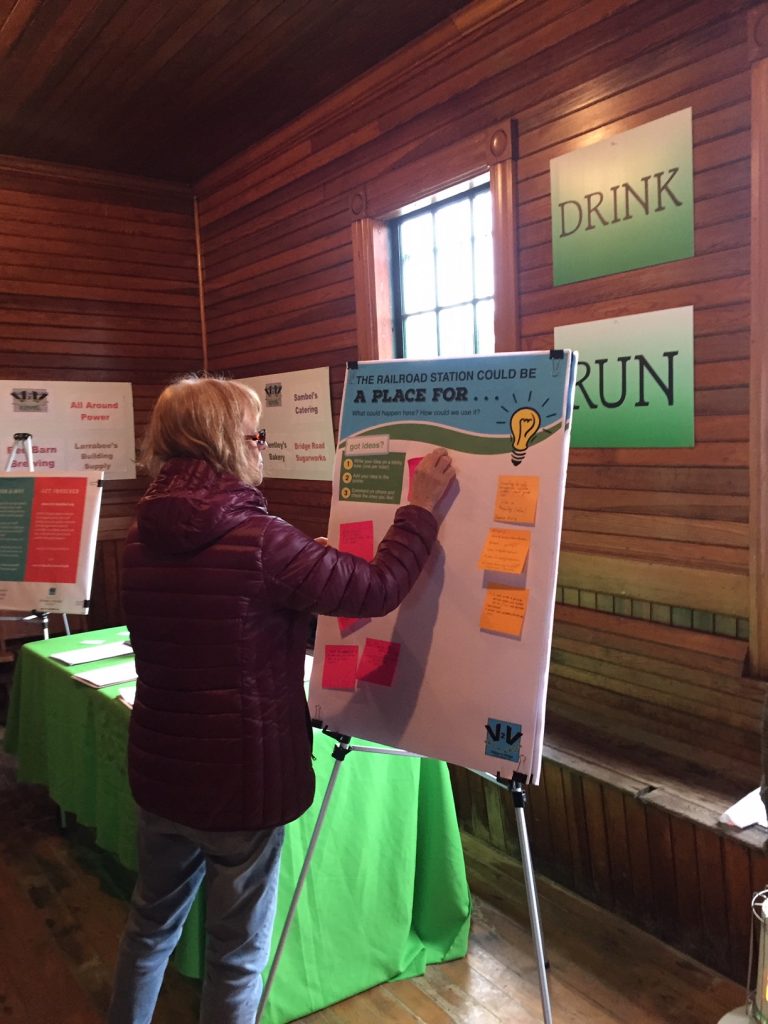
Eligibility hints
Promoting smart growth
Media buys and public forums to support a smart growth neighborhood plan would be eligible, but similar actions to stop smart growth development within an existing neighborhood would not.
Transportation
Public engagement on a public trails system or integrated street network for the community, or design and integration of a commuter lot into a town center would be eligible, but advocating for the Circ Highway or equivalent bypass/new highway construction would not.
Housing
Developing a strategy to incorporate additional housing, such as accessory units, into existing neighborhoods would be eligible as would the development of options for inclusionary zoning, but developing a plan for a suburban subdivision not compliant with Smart Growth policies would not.
Events
Bringing in an expert for analysis or a charrette (a hands-on planning exercise) as part of a community event or conference would be eligible, but general funding support for conferences would not.
-
What is not eligible?
The following activities are ineligible for grant funding:
- Lobbying or partisan activities
- Land or building acquisition
- Local municipal matching requirements
- Capital improvements (signs, way-finding, construction projects, bike racks)
- Equipment (e.g. computers, printers, vehicles).
Note: While wifi and software costs connected to specific smart growth projects may be eligible, Small Grants cannot be used to support baseline municipal infrastructure
-
Evaluation criteria
The project or activities being proposed must:
- Embody the vision of smart growth and meet multiple smart growth principles
- Be inclusive in the engagement of the public, with focused efforts that enable access to a cross-section of community members, especially those who historically have not had access to public processes
- Promote a healthy, just, safe, and sustainable community
- Work towards a lasting solution to an identified problem or opportunity
- Be able to be completed within a one-year time frame, and
- Have a clear focus and concrete outcomes
-
How to apply
Fill out the application form here.
Applications are accepted on a rolling basis for amounts up to $2,500.
VNRC determines when the application is complete. As a condition of any grant, all activities are to be completed within the timeline given. In addition, grant recipients agree to give VNRC permission to feature the project in its printed and electronic materials. Where appropriate, grantees agree to note that the project is “Paid for with the assistance of the Small Grants for Smart Growth Fund of the Vermont Natural Resources Council.” Upon completion, a paragraph on the accomplishments, with images or illustrations if available, is to be submitted to VNRC who then forwards this on to the funder.
Please send materials to:
Kati Gallagher, Sustainable Communities Program Director, at kgallagher@vnrc.org.
Applicants will typically receive a response from VNRC within 30 days of the day we receive the application.
If you are unable to access the application form, please submit a two page (maximum) statement that includes all of the following:
- Name and contact information for the applicant.
- Amount requested and estimated budget.
- Overall project timeline.
- If this funding will be used for a portion of a larger project, clearly identify the portion of the project it will fund.
- Project description. The project description should include the following:
- The problem or opportunity that the project is attempting to address
- The outcomes that will result from your project
- A brief description of how this funding will catalyze your project
- How the project complies with the “eligible activities” listed above
- How the project addresses the six evaluation criteria, including how the project advances smart growth principles
- Historic Danville Railroad Station – Danville, VT
- Old Spokes Home Transportation Equity Coalition – Burlington, VT
- South Hero Community Trails – South Hero, VT
- Epsilon Spires High Street Renewal – Brattleboro, VT
- Rich Earth Institute Nutrient Reclamation Pilot Project – Brattleboro, VT
Cheers to Five Years!
Celebrating the Fifth Anniversary of Small Grants for Smart Growth
Read on to learn more about five outstanding projects from past recipients of the Small Grants for Smart Growth Program.
Highlighting Five Impactful Projects
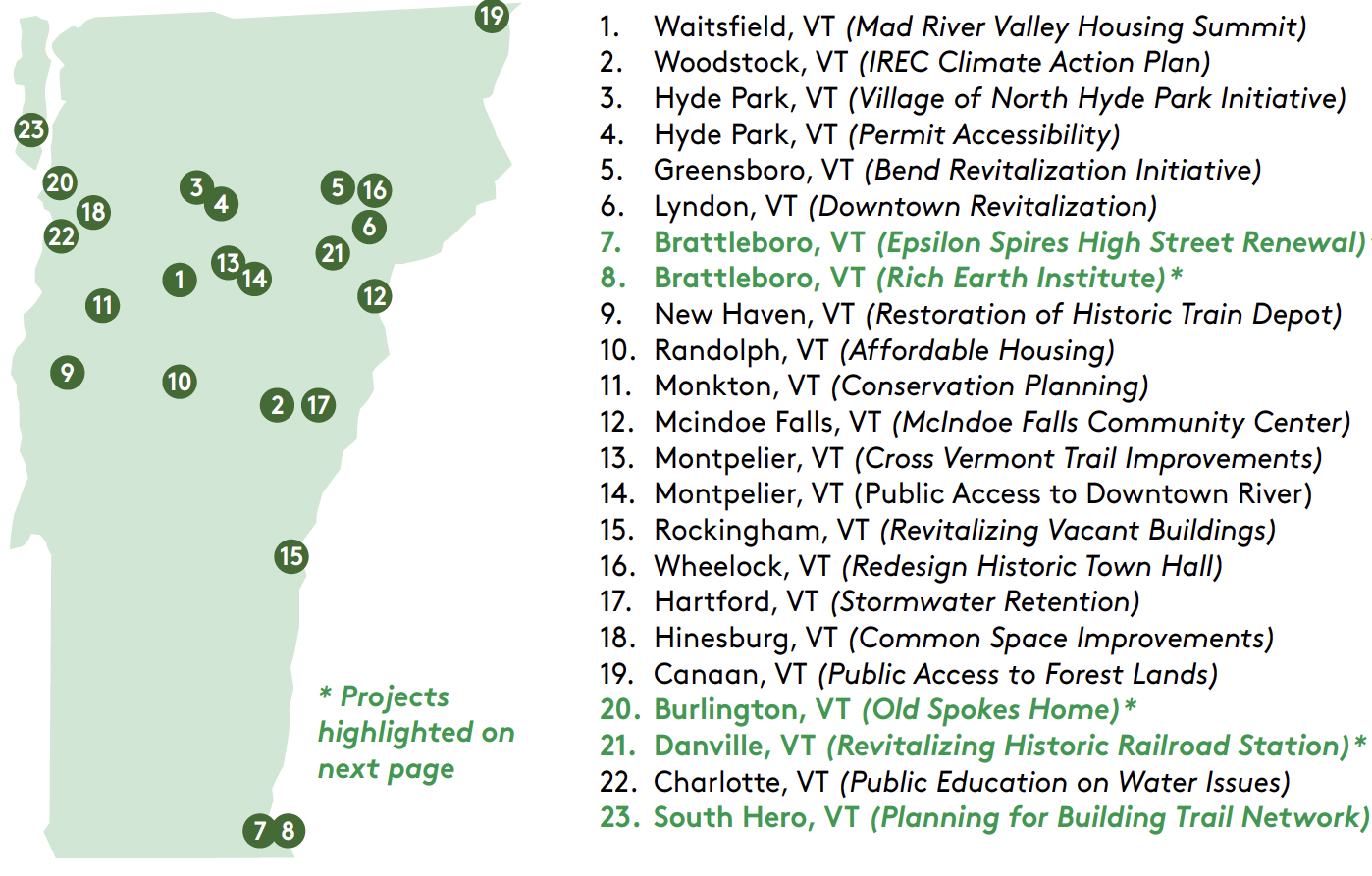
In Vermont, we benefit from decades of community-driven land use planning that set our state apart for protecting natural resources while fostering our downtowns and village centers. Yet we’re also experiencing – along with the rest of the country – the impacts of land development that has been misguided or poorly planned through the connected crises of climate change, biodiversity loss, and housing affordability.
As we work to tackle these challenges as a state, and pursue a Vermont that is welcoming, vibrant, and socially and environmentally resilient, VNRC is proud to celebrate five years of our Small Grants for Smart Growth program. This program provides seed money for catalyzing community-based initiatives related to smart growth, acknowledging that community leadership and small steps are essential for catalyzing change.
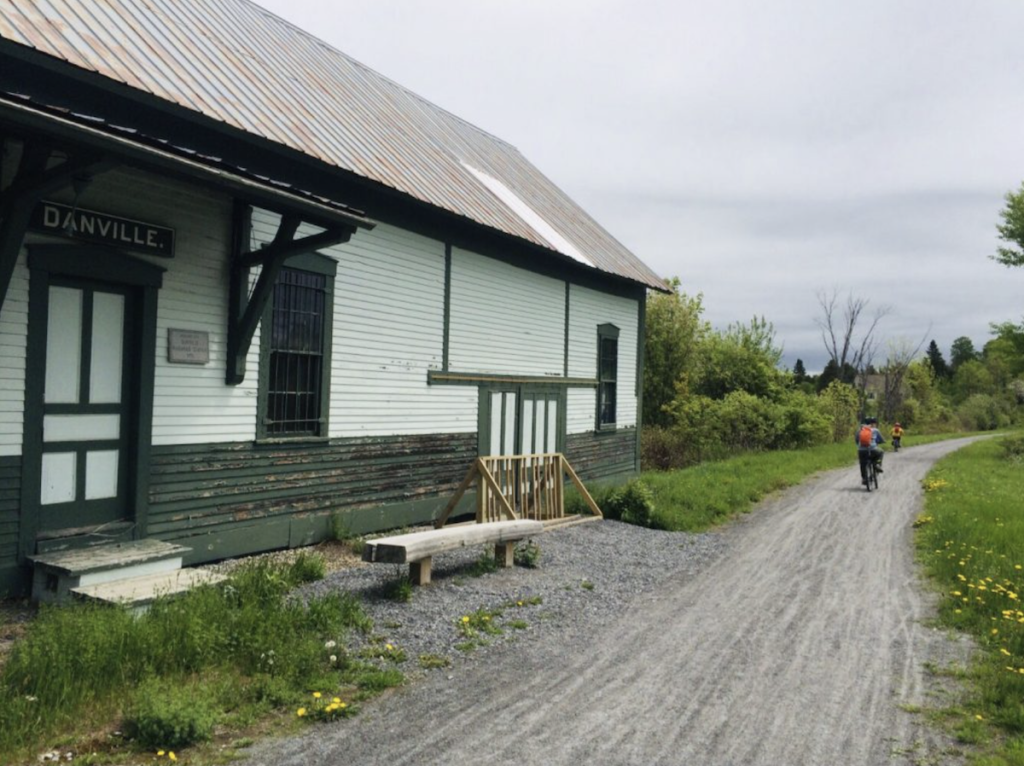
The Danville Village to Village Steering Committee was awarded a Small Grant for Smart Growth to engage the community and revitalize the 1871 Historic Danville Railroad Station near the Lamoille Valley Rail Trail (LVRT). The project aims to leverage the LVRT’s potential to boost Danville’s economic and cultural impact, enhance outdoor recreational opportunities, and restore the cherished historic landmark.
The envisioned Train Station will serve as a transportation and recreation hub, featuring amenities like restrooms, a digital kiosk, and educational displays. Infrastructure improvements, including signage, recreation asset mapping, and guidebooks, are also part of the plan. Further grant funding has been secured for a water station and bike repair station. Construction is set to begin in summer 2023. The committee is redesigning their website and identifying historic markers along the LVRT to complement the Train Station displays. Local businesses are collaborating with the project, and a meeting has been scheduled to explore connections to the initiative and the LVRT. From the Committee: “Thank you again for your support – this event truly helped us to kick-off this effort and no doubt has helped us get to where we are today.
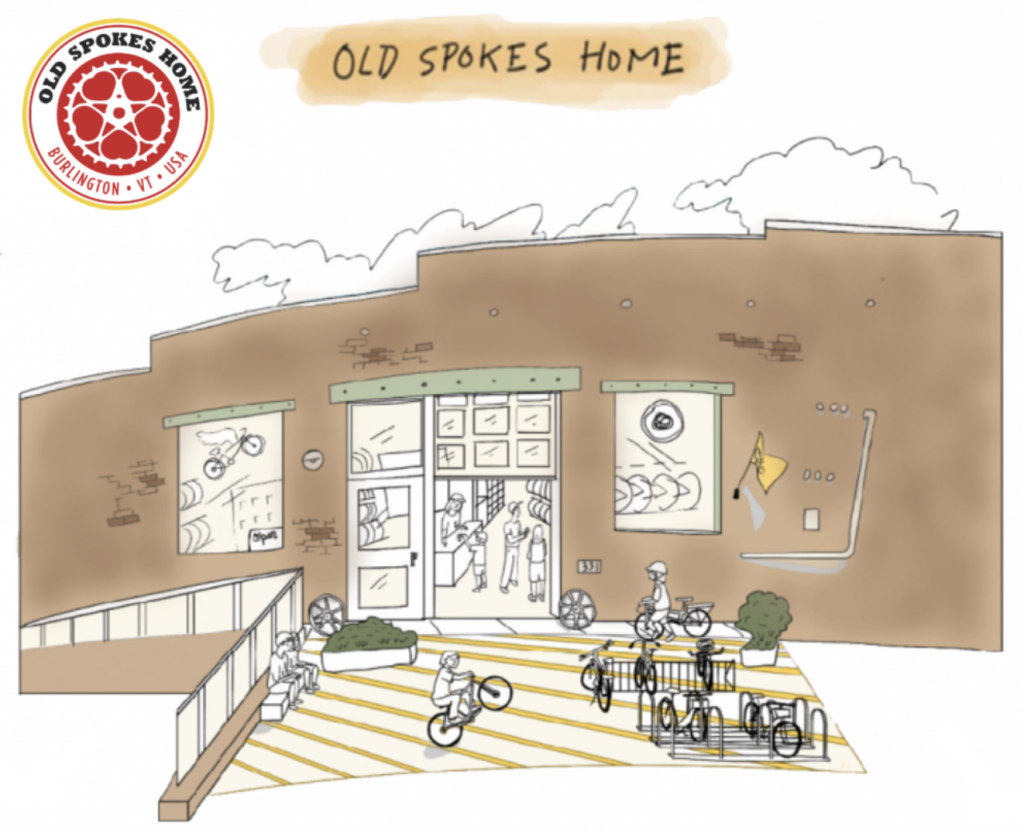
Old Spokes Home, a non-profit bike shop, launched the Transportation Equity Coalition with a Small Grant for Smart Growth, focusing on improving transportation accessibility. Following outreach to initiate a mobility audit in the Old North End of Burlington, they were able to leverage additional funding for a comprehensive audit. Collaboration with local partners resulted in 75 survey respondents from communities that have been marginalized.
The audit in the Old North End was completed in mid-2021.The organization is also working with various partners to ensure diverse voices in transportation planning processes. Old Spokes Home plans to recruit more agencies to join the Transportation Equity Coalition and involve community representatives in designing communication strategies for diverse populations. They also received grants from the Vermont Agency of Transportation, Go! Vermont, and Green Mountain Transit to enhance access to existing transportation options.
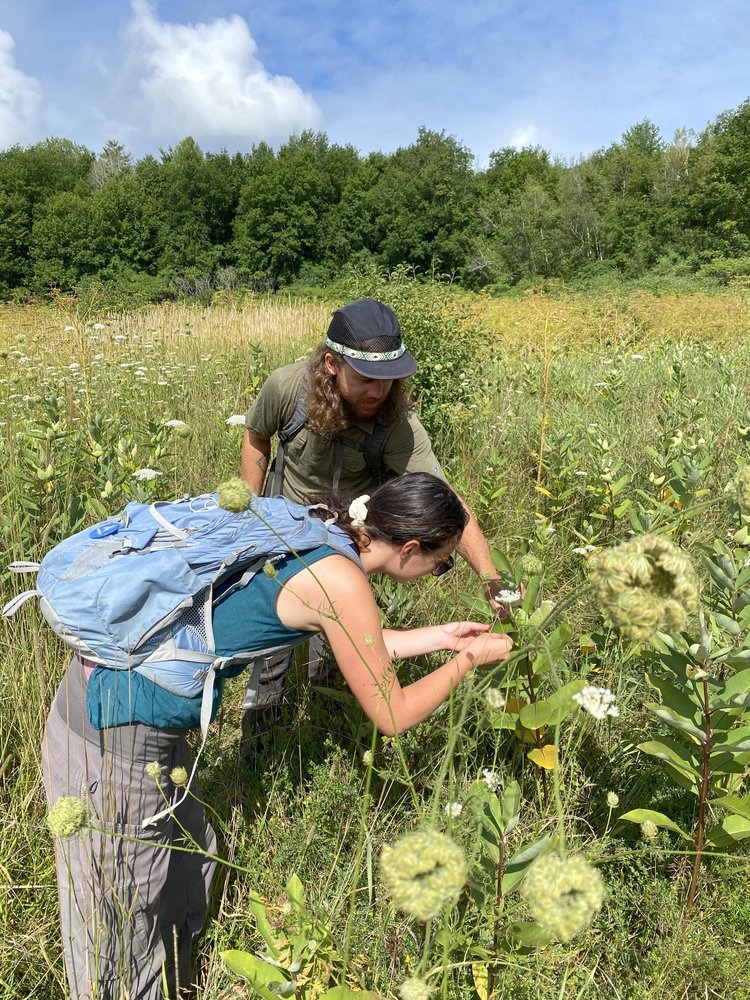
The South Hero Land Trust worked with local partners to develop a non-motorized, multi-use trail network that will connect important community resources and natural areas in the core of South Hero, with seed funding from a Small Grant for Smart Growth. The grant facilitated community engagement efforts and supported ongoing coordination. A connector trail is being developed, fostering partnerships and raising awareness about natural resource access. Building on this initial work, a second project aims to establish a community roadmap for recreational cycling, promoting local businesses and enhancing bike and walkability.
The collaborative effort involves the South Hero Land Trust, Lake Champlain Islands Economic Development Corp, Local Motion, South Hero Recreation Commission, and Northwest Regional Planning Commission.
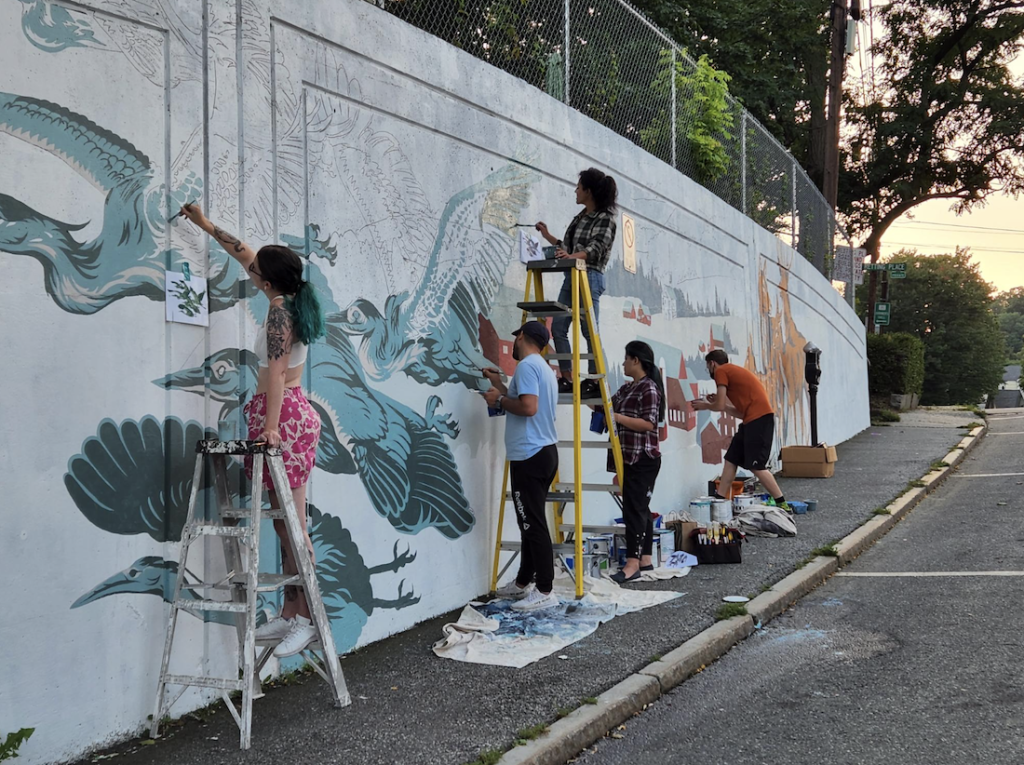
Epsilon Spires, an arts and science non-profit, led a community-driven project to transform a graffitied wall into an inspiring mural representing the region’s local culture. With a Small Grant for Smart Growth, they planned and promoted the High Street Mural through grassroots efforts, including engaging local businesses, community leaders, and neighbors.
Selected for Vermont’s Better Places program, the High Street Mural received a 2:1 matching grant after exceeding their crowdfunding goal. Epsilon Spires shared, “We believe that our award from VNRC made all the difference in our competitiveness for the Better Places Program!” A successful Charity Bingo Night at Whetstone Brewery generated donations and positive feedback. The “Meet the Artists” event allowed community members to view the latest designs and learn about the talented artists. The mural was unveiled on October 7, 2022, at Epsilon Spires.
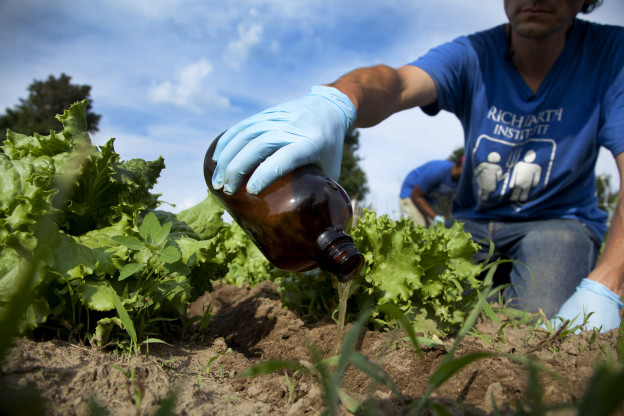
The Rich Earth Institute, a non-profit dedicated to advancing sustainable waste management and nutrient reclamation, was awarded two Small Grants for Smart Growth in 2018 and 2019 to support planning activities and site visits to bring urine diverting sanitation systems to facilities and residences in West Dummerston and Westminster.
Collaborating with the Windham Regional Commission, Rich Earth’s Village Sanitation Pilot Study aimed to alleviate pressure on septic systems in unsewered Vermont villages and assess the feasibility of innovative wastewater solutions. Significant progress has been made, establishing urine diversion installations in various locations. Additional installations are planned, and permits are being pursued. A report detailing the study’s findings was published in 2020 and can be found on Rich Earth’s website. With recent funding from the Thomas Thompson Trust and the National Fish and Wildlife Foundation, Rich Earth aims to maximize their pilot permit for 25 plumbed and 25 unplumbed installations by 2024.
Where are Small Grants given?
All over Vermont! Hover over a symbol in the map below to see where we’ve awarded Small Grants since 2018. Below the map, there’s a list of recipients with details about their projects.
The Small Grants for Smart Growth Program is made possible with assistance from the Humstone Family.
